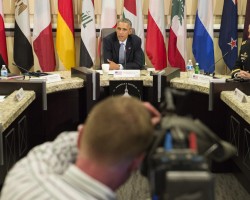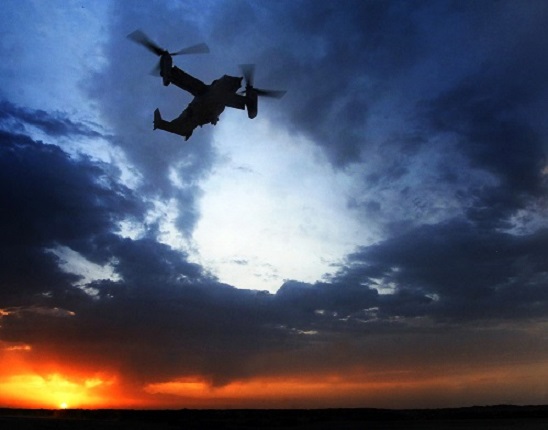The Case for Repealing the 2002 Iraq AUMF
![U.S. Army Spc. Justin Towe scans his area while on a mission with Iraqi army soldiers from 1st Battalion, 2nd Brigade, 4th Iraqi Army Division in Al Muradia village, Iraq. [US Air Force photo by Master Sgt. Andy Dunaway, 3/13/2007]](/wp-content/uploads/2014/07/Soldier-and-Sunset.png)
U.S. Army Spc. Justin Towe scans his area while on a mission with Iraqi army soldiers from 1st Battalion, 2nd Brigade, 4th Iraqi Army Division in Al Muradia village, Iraq. [US Air Force photo by Master Sgt. Andy Dunaway, 3/13/2007]
As the debate continues over how the United States should respond to the Islamic State, the Administration last week reiterated its calls to repeal the 2002 Iraq Authorization for Use of Military Force (AUMF). Indeed, the need for an effective response to the Islamic State not only coincides with the need to repeal the Iraq AUMF, but increases the need to do so. On the one hand, as National Security Advisor Susan Rice argued last week, repealing the Iraq AUMF now would underscore “that ground forces will not be sent into combat in Iraq” as the White House develops and executes plans to counter the Islamic State. On the other hand, repeal would not hamper the Administration since the authorization is no longer being used. Moreover, until the Iraq AUMF is repealed, there remains the potential for a future administration to abuse its authority by engaging in military actions that it claims are pursuant to the law but actually are radically different from the specifically-focused actions against Saddam Hussein’s regime that the authorization intended. For these reasons, taking the 2002 law off the books would support, not restrict, American national security.
Whether armed conflict is necessary or will become necessary to confront the Islamic State is a different, but important debate. What is clear is that any armed conflict would not fit under the Iraq AUMF. There are other legal justifications that could authorize the limited use of force against the Islamic State, such as Article II of the Constitution and the War Powers Resolution, but any sustained use of force against the Islamic State should receive its own, independent authorization. But regardless of the means used in confronting the Islamic State, any options pursued in Iraq today – whether using armed force or otherwise – should ultimately support a political settlement.
It’s time to repeal the 2002 Iraq AUMF: The law is no longer in use and repeal would build confidence in the limited nature of any campaign to confront the Islamic State. National Security Advisor Susan Rice wrote to Congress calling for the “repeal of the outdated 2002 Authorization for Use of Military Force in Iraq (P.L. 107-243). With American combat troops having completed their withdrawal from Iraq on December 18, 2011, the Iraq AUMF is no longer used for any U.S. government activities and the Administration fully supports its repeal. Such a repeal would go further in giving the American people confidence that ground forces will not be sent into combat in Iraq.” [Susan Rice, 7/25/14]
Leaving the 2002 Iraq AUMF on the books leaves the door open to abuse. The danger of leaving unneeded war authorizations on the books was highlighted by recent legal arguments from prominent legal scholars that the 2002 law “almost certainly” would authorize the use of force in Iraq today against the Islamic State. These arguments are more worrying given the support they might garner among some conservatives: Buck McKeon pushed back against the idea that the authorization should be repealed, responding to Susan Rice’s argument for repeal by saying, “Why is she fighting Congress instead of [the Islamic State]?”
While armed conflict may or may not be an appropriate response to the Islamic State, the legal basis and legitimacy of any potential conflict should be firmer than inappropriately repurposing an outdated law. Furthermore, the idea that the 2002 AUMF could legitimately justify strikes on the Islamic State has a number of problems. Legal scholar Steve Vladeck explains, “Almost every passage in the 2002 AUMF—including both the preamble and the operative paragraphs—is written with that express purpose and design [to resolve concerns that Saddam Hussein was assembling weapons of mass destruction in defiance of Security Council resolutions]. Indeed, the resolution even conditions the exercise of the authorized use of force on the President’s assurance that ‘further diplomatic or other peaceful means alone … is not likely to lead to enforcement of all relevant United Nations Security Council resolutions regarding Iraq.’ If Saddam had fully capitulated to all Security Council resolutions the next day, presumably the Iraq AUMF would have been, for all practical purposes, essentially defunct.” [Jack Goldsmith, 6/13/14. Buck McKeon, 7/28/14. Steve Vladeck, 6/17/14]
Any armed conflict against the Islamic State should receive its own authorization from Congress, not be tacked on to other authorizations. On Friday, the House voted overwhelmingly (370-40) in support of a resolution iterating that a “sustained combat role in Iraq” would require “specific statutory authorization” from Congress. The vote followed on a letter signed by over a 100 members of the House that outlines the argument for “respect for the constitutional requirements for using force abroad. The Constitution vests in Congress the power and responsibility to authorize offensive military action abroad. The use of military force in Iraq is something the Congress should fully debate and authorize. Members of Congress must consider all the facts and alternatives before we can determine whether military action would contribute to ending the most recent violence, create a climate for political stability, and protect civilians from greater harm.” To their credit, the Obama Administration has consistently committed to engage closely with Congress in developing and executing new policies in Iraq. [House Letter, 7/2/14]
The United States has options for confronting the Islamic State short of armed conflict:
The priority for restoring stability in Iraq is the formation of a government that restores a sense of legitimacy in Baghdad. The crisis in Iraq will not be resolved without substantive political reforms from the Iraqi government. As Brian Katulis, NSN Board Chairman and Senior Fellow at the Center for American Progress, wrote with his CAP colleagues Hardin Lang and Vikram Singh, “Prime Minister Maliki’s sectarian policies squandered the sacrifices of Americans by not producing an inclusive government.” They continued by saying “All further aid – beyond some actions directly aimed at degrading ISIS and humanitarian assistance for those displaced by the crisis – should be conditioned on a unified, cross-sectarian response by Baghdad and commitment to greater regional autonomy and inclusive governance.” There are promising signs that this is taking place: Amid opposition from the United States and Iran, Iraq’s governing coalition is considering alternatives to Nouri al-Maliki, the country’s divisive Prime Minister. [Brian Katulis, Hardin Lang, and Vikram Singh, 6/17/14]
The United States can support the Iraqi government and address the threat posed by the Islamic State through means that do not require an authorization for use of military force. The United States has deployed 300 advisors to Iraq and has ramped up its intelligence operations to include approximately 50 surveillance sorties over the country each day. As NSN Senior Advisor Maj. Gen. Paul Eaton (Ret.), who was assigned to Iraq from 2003 to 2004 as Commanding General of the Coalition Military Assistance Training Team (CMATT), has written, “The President’s decision to deploy 300 adviser/trainers to Iraq will allow the U.S. military to do in Iraq what it does so well in over 70 countries. They will impart American war-fighting expertise, serve as confidence-builders, and provide the command and control links to combat multipliers such as ISR (Intelligence, Surveillance, and Reconnaissance) aerial-delivered fire support and logistics. This will further allow development of target-level detail should the President decide to deploy drones or manned combat systems. Further, they can serve as the feedback loop to inform the President about Iraqi military performance or sectarian issues.” The United States has also reportedly worked to reestablish its connections to the Sunni militias that helped turn the tide against al-Qaeda in Iraq in 2006 and 2007, which are now organizing against the spread of the Islamic State in northern Iraq. In the near-term, the United States can continue its intelligence operations while working with regional partners without engaging in an armed conflict that would require AUMF legislation. [Paul Eaton, 6/13/14]





